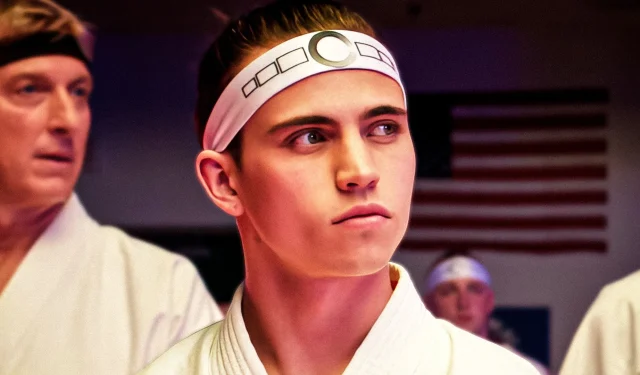Initial Reaction to Robby Keene’s Ending in Cobra Kai
Upon my first viewing of Cobra Kai, Robby Keene’s conclusion left me feeling unsettled. His defeat at the hands of Axel during the Sekai Taikai tournament seemed like a disservice to his character, especially after six seasons rich with emotional turmoil. Robby has long been a pivotal character, navigating the contrasting philosophies of Johnny Lawrence and Daniel LaRusso. Following such intense internal struggles and moral development, I anticipated a clear victory for him. Yet, his final moments in the series didn’t meet these expectations, diverging from the traditional climactic outcomes fans usually relish in a tale defined by rivalry and competition.
Revisiting The Karate Kid and New Perspective
However, after rewatching the classic The Karate Kid, my understanding began to shift. I started to view Robby’s conclusion not as a letdown but as a purposeful narrative choice. This decision reshaped the interpretation of Johnny Lawrence’s original defeat. The similarities between Johnny and Robby—both emotionally invested in tournaments they did not win—illustrate the narrative growth of Cobra Kai away from simpler storytelling styles. While Robby didn’t secure a win in the conventional sense, his journey concluded in a way that might hold even greater significance.
The Significance of Robby’s Loss
Initially, Robby’s defeat in the Sekai Taikai tournament felt disappointing. His path to becoming a committed martial artist—from a troubled youth to someone seeking balance—culminated in what seemed like an anticlimactic ending. This wasn’t merely about losing; the absence of emotional resonance in his defeat felt like a disservice to his character development.
Throughout Cobra Kai, Robby stood as a tragic figure caught between Johnny and Daniel, often isolated due to his choices and family complications. However, as the series progressed, he began to evolve. His choice to distance himself from Cobra Kai’s negativity, mend his bond with Johnny, and foster a friendship with Miguel foreshadowed a redemption arc. Robby had tirelessly sought approval—from Johnny, Daniel, and himself—making his loss appear as yet another setback in an ongoing struggle.
Emotional Maturity and Growth
What made his Sekai Taikai defeat particularly striking was his poised demeanor throughout the fight. Despite being at his peak—emotionally steady and focused—victory eluded him. After experiencing a myriad of trials, I felt he had earned a symbolic win, one that typically signifies a character finally achieving their arc’s resolution. In place of a triumph, however, Robby’s conclusion was one of subtler complexities.
Comparing Johnny and Robby’s Losses
In reflecting upon The Karate Kid after finishing Cobra Kai, I noted striking parallels between Johnny Lawrence’s 1984 defeat and Robby’s modern loss at the Sekai Taikai. Each character entered their tournaments with profound personal stakes. For Johnny, victory represented holding onto his identity, fueled by Cobra Kai’s harsh philosophies. Conversely, for Robby, the tournament was an opportunity to demonstrate his capacity for balance, devoid of revenge.
Contrasting Reactions to Defeat
Despite their shared losses, the repercussions for Johnny and Robby diverged significantly. Johnny’s defeat initiated a downward spiral into humiliation and despair, epitomized by his assault at the hands of his sensei, John Kreese. This incident encapsulated the toxic mentorship inherent in Cobra Kai.
In stark contrast, Robby’s setback was met with dignity and personal growth. Surrounded by a supportive network, particularly Johnny, he received encouragement rather than abandonment following his loss. This support highlights the transformation in dynamic between mentor and student, creating a poignant juxtaposition to Johnny’s earlier experiences.
The Evolution of Mentorship in Cobra Kai
The brilliance of Cobra Kai lies in its ability to redefine the emotional fallout of similar circumstances. While Johnny once faced defeat alone, Robby leaves his journey surrounded by those who acknowledge his worth beyond mere victories. He parts ways not with a trophy, but with meaningful connections and an optimistic future.
This transition underscores how Johnny has successfully built a healthier environment for his students. Robby’s loss serves as Johnny’s redemption, demonstrating the transformative power of mentorship that fosters resilience rather than toxicity. Robby’s journey illustrates that true success lies in maintaining relationships and integrity, regardless of competition outcomes.
Robby’s Growth Compared to Johnny’s
Robby’s ability to cope with loss stands in stark contrast to the emotional turmoil Johnny faced in his younger years. By the series finale, Robby has not only reconciled with his father but also established peace with his rivals, carving out an identity independent of the dojo’s rigid boundaries.
This evolution in Robby’s character isn’t merely an individual triumph but also serves as a profound narrative evolution for the legacy of Cobra Kai. Johnny has confronted and discarded his past of toxic competition, ultimately achieving something more meaningful than a title in the ring: the ability to nurture a student and a son who can endure setbacks without losing their confidence. Robby’s narrative concludes by validating this invaluable lesson.
In summary, Robby’s ending is a testament to transformative character growth. With no championship belt to display, he emerges with something more significant: an understanding that true victory resides in the capacity to navigate challenges and setbacks with grace. This narrative reframing honors the emotional pillars of The Karate Kid, suggesting that the most profound victories are not rooted in championships, but in learning to thrive beyond the arena.


